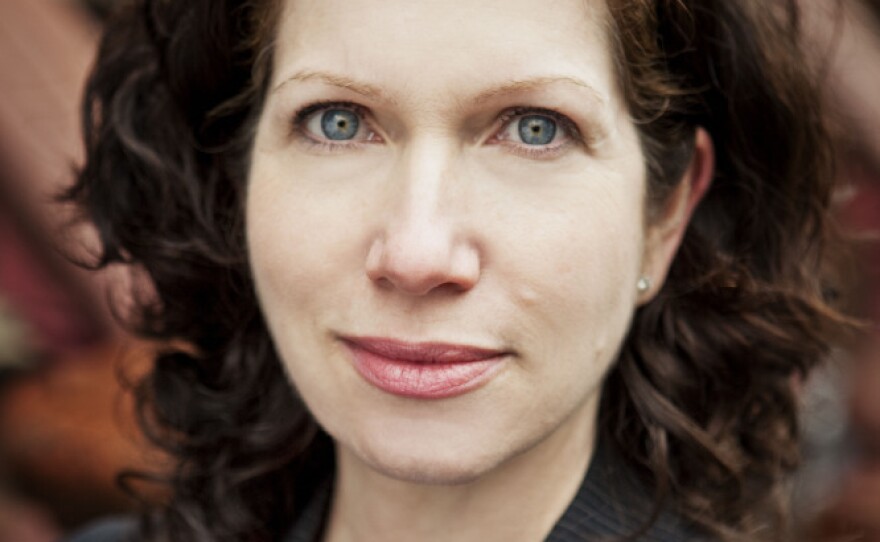A new novel by former New York Times reporter Amy Waldman takes a close look at post-Sept. 11 America. In it, Waldman imagines an anonymous competition to pick the design for a Sept. 11 memorial at ground zero, and the furor that erupts when it's revealed that the winning designer is an American Muslim.
Waldman reported on Sept. 11 from New York and was later based in South Asia. She describes the winning memorial design in her book, The Submission:
The concept was simple: a walled, rectangular garden, guided by rigorous geometry. At the center would be a raised pavilion meant for contemplation. Two broad perpendicular canals quartered the six-acre space. Pathways within each quadrant imposed a grid on the trees — both living and steel — that were studded in orchard-like rows.
The garden's designer, American-born architect Mohammad Khan, is a non-observant Muslim who goes by Mo. When the jury selecting the memorial discovers his identity, Mo is pressured to explain his design and denounce the terrorist attacks. Waldman tells NPR's Melissa Block why he stubbornly refuses to respond.
"From his point of view, he keeps saying he would never ask these questions of a designer who wasn't Muslim," Waldman says. "They're coming back at him and saying, 'Things changed with this attack, and you do have to answer these questions. You do have to reassure us. And if you think these attacks were wrong, why won't you come out and say so?' "
Exploring 'The Specter Of Violence'
In light of the recent fights over what became known as the ground zero mosque, the plot of Waldman's novel may sound familiar. But she says she actually started writing well before that controversy erupted.
"I had the idea initially in 2003 or [2004] and started working on it probably in 2007," she says.
Waldman says the controversy surrounding the ground zero mosque put an interesting spin on what she had already written, but considering the violence that followed — including the stabbing of a Muslim cab driver in New York — she felt it necessary to do some rewrites.
"The specter of violence was not in the book as much," she says. "I started thinking about that more and that found its way more strongly into the novel."
Indeed, the conflict in Waldman's book escalates well beyond the memorial's design: There are incidents of people ripping headscarves off Muslim women; Muslim groups start organizing self-defense patrols; and a group called "Save America From Muslims" is formed.
"I just started thinking [about] the way in public controversies like this one thing leads to another, leads to another and suddenly it's out of control in ways nobody could predict or necessarily wanted," Waldman says. "Some of that is fed by the media. But some of it is just individuals reacting and acting, and that's an entirely separate thread I was really interested in exploring in the novel."
Take the character Sean Gallagher, an activist whose firefighter brother died in the attacks. In a moment of impulse and frustration, Gallagher pulls a woman's headscarf off, which leads to copycats, which lead to Muslim defense squads.
"I'm interested in how these things spiral and change through time," Waldman says. "You know, often just one person's action — often not pre-thought — has all these unexpected consequences."
Questions For A Post-Sept. 11 America
In the book, Waldman includes perspectives from the community and from victim's families, but those are, for the most part, based on her own impressions.
"I didn't seek out victims' families ... partly because I didn't feel right asking them to offer up their experience for a novel," she says. "But also, I didn't want to be sitting there worrying, 'Would they like this? Would they not like this? Would they be offended? Is this true to their experience?' That would paralyze me as a fiction writer."
At the same time, Waldman says she recognized that it would have been impossible to reflect every familiy's experience of Sept. 11.

"If you look at the last 10 years, they are not a monolith," she says of the victim's families. "They are all kinds of opinions; all kinds of politics. They're human beings like anybody else, and they've all reacted to this event and everything that's come afterwards in very different ways. And I felt like it was honest to try to represent that."
Waldman says she wanted to tackle questions unique to a post-Sept. 11 America: "What kind of country are we? Who are we? What should have changed because of this? What are we justified in changing because of this? Are our values the same? ... What does it mean to be America and American today? And then, looking specifically at Mohammad Khan, even who is an American?"
With this year's unveiling of the National September 11 Memorial & Museum at ground zero, on the 10th anniversary of the attacks, Waldman may actually get some answers. "It's strange — the whole way the novel is sort of braided with reality, I think, will climax in some strange way in seeing that memorial open," she says.
"Somebody just asked me where I was planning to be on 9/11, and I hadn't thought about it," she says, "but I do know I want to be in New York."
Copyright 2023 NPR. To see more, visit https://www.npr.org. 9(MDAzMjM2NDYzMDEyMzc1Njk5NjAxNzY3OQ001))






